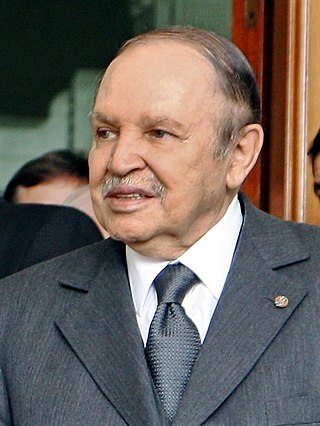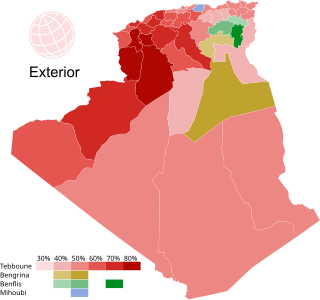
Abdelaziz Bouteflika was an Algerian politician and diplomat who served as the seventh president of Algeria from 1999 to his resignation in 2019.

Macky Sall is a Senegalese politician who served as the fourth president of Senegal from 2012 to 2024. He previously served as the eighth prime minister from 2004 to 2007, under President Abdoulaye Wade and president of the National Assembly from 2007 to 2008.

Presidential elections were held in Algeria on 15 April 1999. Abdelaziz Bouteflika was elected with 74% of the vote after the other six candidates withdrew on the eve of the elections.

Presidential elections were held in Algeria on 17 April 2014. Incumbent President Abdelaziz Bouteflika was re-elected with 82% of the vote. Issues in the campaign included a desire for domestic stability after the bloody civil war of the 1990s, the state of the economy, the frail health of 77-year-old president Abdelaziz Bouteflika who had been in power for fifteen years, and whose speech was "slurred and inaudible" in his only public outing during the campaign, and the less-than-wholehearted support given the president by the normally united and discrete ruling class.

El Alia Cemetery is a cemetery in a suburb of Algiers in the commune of Oued Smar in Algeria the result of the donation in 1928 of a 78 hectares plot of land by its owner called "El Alia" means in Arabic which is high, but came from the surname of the donor of the land in 1928, Hamza El-Alia before her departure to mecca.

Parliamentary elections were held in Chad on 29 December 2024, along with elections for regional and local offices. These are the first legislative elections to be held in Chad since 2011, and the first since the death of long-time ruler Idriss Déby in 2021, and the accession to leadership of his son, Mahamat Déby, first as leader of a military junta then as president in his own right, laying the groundwork for a hereditary dictatorship.

Presidential elections were held in Equatorial Guinea on 24 April 2016. In a vote initially scheduled for November but brought forward by seven months, incumbent President Teodoro Obiang Nguema Mbasogo retained his office, allegedly with 93.7 percent of the vote and a 92.7% turnout.

Presidential elections were held in Gabon on 27 August 2016. Incumbent President Ali Bongo Ondimba ran for re-election and was challenged by former Minister of Foreign Affairs Jean Ping. On 31 August, the electoral commission proclaimed Bongo's re-election with a margin of less than two percent. Large protests broke out in the capital Libreville after the results were announced. Irregularities such as Haut-Ogoou showing that 99.9% of the electorate had voted and Bongo had received 95.5% of the votes led to observers questioning the conduct of the election.

A constitutional referendum was held in Ivory Coast on 30 October 2016. Voters were asked whether they approve of a proposed new constitution. The new constitution would create a Senate, remove the nationality clause from the presidential requirements and establish the post of Vice-President. The constitution was approved by 93.42% of votes with a 42.42% turnout, as announced by the president of the Independent Electoral Commission (CEI).

Abdelmadjid Tebboune is an Algerian politician currently serving as the President of Algeria since December 2019 and as Minister of Defence.

Presidential elections were held in Algeria on 12 December 2019. The election had originally been scheduled for 18 April, but was postponed due to sustained weekly protests against plans by the incumbent president Abdelaziz Bouteflika to run for a fifth term. Bouteflika resigned on 2 April and Abdelkader Bensalah was elected acting president by parliament a week later. On 10 April the election was rescheduled for 4 July. On 2 June the Constitutional Council postponed the elections again, citing a lack of candidates. A new electoral authority, Autorité nationale indépendante des élections (ANIE), was created in mid-September as an alternative to the existing Haute instance indépendante de surveillance des élections (HIISE) defined by the 2016 constitution. The election was rescheduled for 12 December 2019 and ANIE, of disputed constitutional validity, announced five valid candidates on 2 November. In their 200000 strong protest on 1 November, Algerian protestors rejected the 12 December election and called for a radical change in the system to take place first. The Forces of the Democratic Alternative (FDA) alliance and the Justice and Development Front also called for boycotting the 12 December election, and the FDA called for creating a constituent assembly.

Snap parliamentary elections were held in Algeria on 12 June 2021 to elect all 407 members of the People's National Assembly. Initially expected to be held 2022, the elections were brought forward following a constitutional amendment approved in a referendum in November 2020.

A constitutional referendum was held in Algeria on 1 November 2020. The subject of the referendum was a revision of the Algerian constitution, and it follows a series of protests known as Hirak.
Events from 2021 in Algeria.
The Benabderrahmane government was the forty-ninth government of the People's Democratic Republic of Algeria. It was a government formed by Aymen Benabderrahmane under President Abdelmadjid Tebboune, following 2021 legislative election and the dissolution of the Third Djerad government on 7 July 2021.

General elections were held in Gabon on 26 August 2023. Incumbent president Ali Bongo ran for re-election, representing the Gabonese Democratic Party, which had ruled the country continuously since its independence from France in 1960, including 41 years under Bongo's father, Omar.

Parliamentary elections were held in Togo on 29 April 2024 to elect the 113 members of the National Assembly, alongside the first regional elections in the country. The ruling Union for the Republic won 108 of the 113 seats.

General elections were held in Rwanda on 15 July 2024 to elect the president and members of the Chamber of Deputies.

Presidential elections were held in the Comoros on 14 January 2024. Election officials initially announced on 16 January that incumbent president Azali Assoumani had been re-elected with 63% of the vote, with a voter turnout of just 16%. However, the Supreme Court approved a set of results that showed Assoumani receiving 57% of the vote, with voter turnout at 56%.
Events in the year 2024 in Algeria.



















